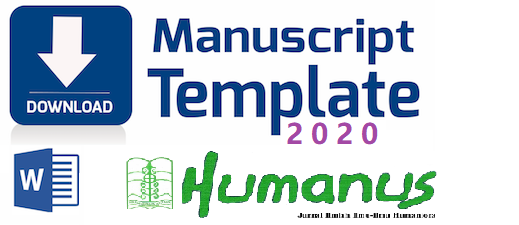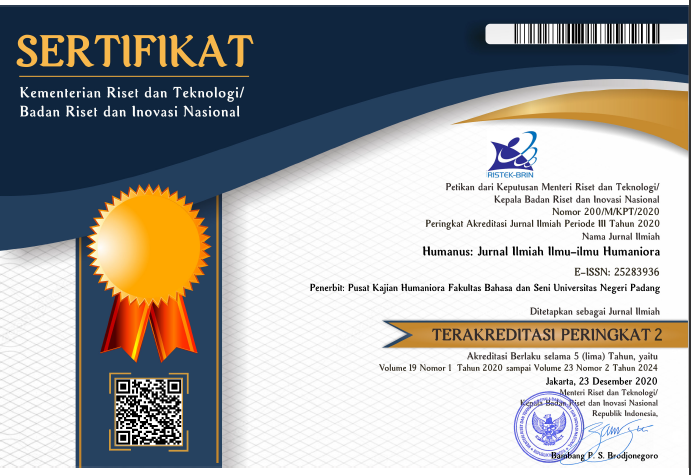Employing the Role of English Language in the Mode of Thought and Action for Guides Professional Function: The Case of Mentawai Tourism
 ), Amran Rasli(2), Diana Kartika(3), Zaitul Zaitul(4),
), Amran Rasli(2), Diana Kartika(3), Zaitul Zaitul(4), (1) Universitas Bung Hatta
(2) Faculty of Business and Communication, INTI International University
(3) Universitas Bung Hatta
(4) Universitas Bung Hatta
 Corresponding Author
Corresponding Author
Copyright (c) 2023 Humanus: Jurnal Ilmiah Ilmu-ilmu Humaniora
DOI : https://doi.org/10.24036/humanus.v22i1.120453
Full Text:
 Language : en
Language : en
Abstract
Globalization in tourism has penetrated remote indigenous villages of Mentawai, in which English language plays an important role in tourism. Tour guides employ the English language role in the mode of thought and action in performing their professional functions in serving foreign tourists. In Mentawai tourism, guides play important role due to that local people can not speak in English. Study on the English role in relation to the guide professional function is importantly examined to formulate the English roles employed by guides in performing their task (function) as guide in indigenous culture-based tourism, Mentawai. Unfortunately, the role of English language in the language modes for the guides professional function is not examined in Mentawai tourism. The study examines the role of English language in relation to guides professional function in Mentawai tourism. The purpose is to formulate the roles of English language in the mode of thought and action employed by guides in performing their jobs as guide. The study applied qualitative and quantitative methods. Findings are that the English language is employed by guides in three roles. in the mode of thought, English language plays as interactive and communicative role, while in the mode of action (social mode), English language plays as social role. In the social role, English language is employed in various forms of phatic utterance (small talk) with various functions. Guides emloy the social role to build and maintain social relationship with foreign tourists. In the mode of thought, English language is employed to interact verbally with tourists, and to convey tourism-related information to tourists. In conclusion, English language play an importand role socially, interactively, and communicatively in the guide professional function.
Keywords
References
Al-Khatib, Mahmoud. (2005). English in the workplace: An analysis of the communication needs of tourism and banking personnel. Asian EFL Journal, 7.2: 174 -194
Al-Tarawneh, Mohammad Qasim dan Ulker Vanci Osam. (2019). Tourism English training at the tertiary level in Jordan: Reality and expectations from a university context. Journal of Hospitality, Leisure, Sport & Tourism Education. Homepage: www.elsevier. Com/locate/jhlste
Al-Saadi, N. (2015). The Importance of English Language in the Development of Tourism Management. Academic Journal of Accounting and Economics Researches, 4 (1), 33 – 45.
Brutt-Griffler, J. (2002). World English. Clevedon: Multilingual matters.
Chang, F.-F., 2010. The fifive steps of qualitative data analysis: climbing up a ladder of abstraction. Journal of Elementary Education 35, 87–120.
Cohen, E. (1985). The tourist guide: The origins, structure and dynamics of a role. Annals of Tourism Research, 12(1), 5–29.
Dahles, Heidi. (2002). The politics of tour guiding image management in Indonesia. Annals of Tourism Research, Vol. 29, No. 3, pp. 783–800.
Dardjowidjojo, S. (2003). English Policies and Their Classroom Impact in Some ASEAN/Asian Countries. K.E. Sukamto (Ed), Rampai Bahasa, Pendidikan, dan Budaya: Kumpulan Esai Soenjono Dardjowidjojo, 63-82. Jakarta: Yayasan Obor Indonesia.
Elfiondri. et.al. (2019a). Indigenous Tradition Based-Tourism Development: Foreign Tourist's Memorable Tourism Experience In Mentawai, Indonesia. Humanities & Social Sciences Reviews.
Elfiondri. et.al. (2019b). English and Indigenous Mentawai Tradition: The Case of Using English Phatic Communion Spoken by Ojek Drivers in Siberut Mentawai, Indonesia. Asian EFL Journal Research Articles. Vol. 25 Issue No. 5.2 October 2019, http://www.asian-efl-journal.com.
Elfiondri. (2020). Developing Culture Tourism Villages: Tradition and English Need. Social Science and Humanities Journal. http://sshj.in/index.php/sshj/
Elfiondri, et.al. (2021). Traditions, Cultural Contact, English Tourism: The Case of Mentawai, Indonesia. Heliyon.
Fornell, C., & Larcker, D. F. (1981). Structural Equation Models with Unobservable Variables and Measurement Error: Algebra and Statistics. Journal of Marketing Research, 18(3), 382. https://doi.org/10.2307/3150980
Hair, J., Anderson, R., Tatham, R. and Black, W. (1998), Multivariate Data Analysis with Readings, 5th ed., Prentice-Hall, Englewood Cliffs, NJ.
Hair, J. F., Black, B., Babin, B., Anderson, R. E. and Tatham, R. L. (2009), Multivariate Data Analysis, Pearson Education, Taipei.
Holloway, J. C. (1981). The guided tour a sociological approach. Annals of Tourism
Research, 8(3), 377–402.
Jin, Ying. (2018). Small talk in medical conversations: Data from China. Journal of
Pragmatics. https://doi.org/10.1016/j.pragma.2018.06.011.
Kusbiantoro, K., Anthonius, R., & Santosa, I. (2016). Modernisasi dan komersialisasi UMA masyarakat Mentawai sebuah deskrupsi fenomenologis (Modernization and commercialization of Mentawai community traditional house, a phenomenological description). Jurnal Sosioteknologi, 15(2), 187–199.
Leclerc, D., & Martin, J. N. (2004). Tour guide communication competence: French,
German and American tourists' perceptions. International Journal of Intercultural
Relations, 28(3), 181–200.
Li, Yaoqi, Biqiang Liu, Ruli Zhang, Tzung-Cheng Huan. (2020). News information and tour guide occupational stigma: Insights from the stereotype content model. Tourism Management Perspectives journal homepage: www.elsevier.com/ locate/tmp
Lin, Yi Hsin. (2012). Modeling the important organizational factors of safety management system performance. Journal of Modelling in Management, Vol. 7 Iss 2 pp. 166 – 179
Luoh, H. F., & Tsaur, S. H. (2014). The effects of age stereotypes on tour leader roles. Journal of Travel Research, 53(1), 111–123.
Mackenziea, Susan Houge, Patrick Boudreaua, Eliza Raymond. (2020). Women's adventure tour guiding experiences: Implications for well-being. Journal of Hospitality and Tourism Management, homepage: www.elsevier.com/ locate/jhtm
Mafrudoh, Lut, et. all. (2018). The Accessibility Of Transportation To Support Tourism In The Municipality Of Mentawai Islands.
Malinosski. (1923). The Meaning of Meaning: A Study of the Influence of Language upon Thought and of the Science of Symbolism, Odgen and Richards (Ed.). London: Routledge & Keagan Paul, Ltd.
Mandaasari, Mellati et. all. (2021). The Development of "English Island" as the Main Support of the New Normal Era Tourism Sector in Mentawai Islands. The First International Conference on Government Education Management and Tourism (ICoGEMT) Bandung, Indonesia, January 9th, 2021.
Napitupulu, N. U. (2015). Strategi pemasaran pariwisata budaya mentawai melalui produk kesenian muturuk (Mentawai cultural tourism marketing strategy through quality art products - muturuk). Jurnal Desain & Seni, 2(1), 59–66.
Ponting, J., McDonald, M.G., & Wearing, S. (2005). De-constructing wonderland: Surf tourism in the Mentawai Islands, Indonesia. Society and Leisure, 28, 141-162.
Prachanant, Nawamin . (2012). Needs Analysis on English Language Use in Tourism Industry. The 8th International Language for Specific Purposes (LSP) Seminar - Aligning Theoretical Knowledge with Professional Practice. Procedia Social and Behavior Sciences.
Pristiwasa, I., wayan, T.K., 2017. Motivasi dan persepsi wisatawan terhadap potensi
wisata di kepulauan Mentawai (Tourists’ Motivation and Perceptions on Tourism
Potential in Mentawai Islands). Jurnal Kepariwisataan Dan Hospitalitas 1 (2),
–117.
Ramadhan, S.F., Metusala, D., Sinaga, M.O., 2017. Potensi pengembangan tradisi
etnobotani Sebagai ekowisata Berkelanjutan : Studi kasus Suku mentawai di Pulau Siberut kepulauan mentawai (potential of etnobotany tradition development as sustainable ecotourism: the case of mentawai tribe on Siberut island). Jurnal Pro-Life. 4 (2), 364–374.
Richards, Greg. 2018. Cultural tourism: A review of recent research and trends. Journal of Hospitality and Tourism Management.
Robinson, M., Novelli, M., 2007. Niche tourism: an introduction. In: Novelli, M. (Ed.), Niche Tourism. Routledge, London.
Saftoiu, R. (2012). Small talk e a work of frame. In S. M ada, & R. Saftoiu (Ed.), Dialogue studies: Vol. 17. Professional communication across languages and cultures. Amsterdam, Philadelphia: John Benjamins.
Scherle, N., & Nonnenmann, A. (2008). Swimming in cultural flflows: Conceptualising tour guides as intercultural mediators and cosmopolitans. Journal of Tourism and Cultural Change, 6(2), 120–137.
Towner, N. (2016a). Searching for the perfect wave : Pro fi ling surf tourists who visit the Mentawai Islands. Journal of Hospitality and Tourism Management, 26, 63–71.
Towner, N., & Orams, M. (2016b). Perceptions of surfing tourism operators regarding sustainable tourism development in the Mentawai Islands , Indonesia. Asia Pacific Journal of Tourism Research, 21, 1258–1273.
Tsaur, S. H., & Lin, W. R. (2014). Hassles of tour leaders. Tourism Management, 45, 28–38.
Tsaur, S. H., & Teng, H. Y. (2017). Exploring tour guiding styles: The perspective of tour leader roles. Tourism Management, 59, 438–448.
Tsaur, Sheng-Hshiung, & Jin-Hua Tu. (2019). Cultural competence for tour leaders: Scale development and validation. Tourism Management journal, homepage: www.elsevier.com/locate/tourman
Ümit Şengel (2020). Journal of Hospitality, Leisure, Sport & Tourism Education.
Wang, K. C., Hsieh, A. T., & Huan, T. C. (2000). Critical service features in group package tour: An exploratory research. Tourism Management, 21(2), 177–189.
Weiler, Betty & Kaye Walker. (2014). Enhancing the visitor experience: Reconceptualising the tour guide's communicative role. Journal of Hospitality and Tourism Management. homepage: http://www.journals.elsevier.com
Weng, Lisheng, Zengxian Lianga , Jigang Bao. (2020). The effffect of tour interpretation on perceived heritage values: A comparison of tourists with and without tour guiding interpretation at a heritage destination. Journal of Destination Marketing & Management. homepage: www.elsevier. com/locate/jdmm
Wolf, George. (1989). Malinowski’s ‘Context Of Situation’. Language & Communication, Vol. 9, No. 4, pp. 259-267. Great Britain: Pergamon Press plc
Yu, X., Weiler, B., & Ham, S. (2002). Intercultural communication and mediation: A
framework for analysing the intercultural competence of Chinese tour guides. Journal of Vacation Marketing, 8(1), 75–87.
 Article Metrics
Article Metrics
 Abstract Views : 279 times
Abstract Views : 279 times
 PDF Downloaded : 75 times
PDF Downloaded : 75 times
Refbacks
- There are currently no refbacks.
Copyright (c) 2023 Humanus: Jurnal Ilmiah Ilmu-ilmu Humaniora

This work is licensed under a Creative Commons Attribution-NonCommercial 4.0 International License.










